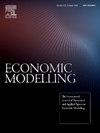家庭风险态度会影响消费支出吗?来自中国城市家庭的证据
IF 4.2
2区 经济学
Q1 ECONOMICS
引用次数: 0
摘要
本研究探讨了家庭风险态度对消费的影响,这是学术界和政策制定者长期关注的主题。现有文献表明,家庭消费受金融和心理因素的影响,但家庭风险态度的作用仍未得到充分探讨。本研究利用中国家庭金融调查的面板数据,采用普通最小二乘法回归分析家庭风险态度与消费行为之间的关系。结果显示,风险规避型家庭的消费水平较低。家庭创业、社会交往和消费信贷等机制被认为是风险态度影响消费的重要渠道。这些研究结果的稳健性通过工具变量分析得到了证实,在不同地区、城市和家庭杠杆水平之间观察到了额外的异质性。这些见解强调了将家庭风险态度纳入刺激消费政策框架的重要性。本文章由计算机程序翻译,如有差异,请以英文原文为准。
Does household risk attitude affect consumption expenditure? Evidence from Chinese urban households
This study investigates the impact of household risk attitude on consumption, a subject of enduring interest to academics and policymakers. Existing literature indicates that household consumption is influenced by financial and psychological factors, yet the role of household risk attitude remains underexplored. Utilizing panel data from the China Household Finance Survey, this research employs ordinary least squares regression to analyze the relationship between household risk attitude and consumption behavior. The results reveal that risk-averse households exhibit lower levels of consumption. Mechanisms including household entrepreneurship, social interactions, and consumption credit are identified as significant channels through which risk attitude affects consumption. The robustness of these findings is confirmed through instrumental variable analysis, with additional heterogeneity observed across regions, cities, and household leverage levels. These insights underscore the importance of incorporating household risk attitude into policy frameworks to stimulate consumption.
求助全文
通过发布文献求助,成功后即可免费获取论文全文。
去求助
来源期刊

Economic Modelling
ECONOMICS-
CiteScore
8.00
自引率
10.60%
发文量
295
期刊介绍:
Economic Modelling fills a major gap in the economics literature, providing a single source of both theoretical and applied papers on economic modelling. The journal prime objective is to provide an international review of the state-of-the-art in economic modelling. Economic Modelling publishes the complete versions of many large-scale models of industrially advanced economies which have been developed for policy analysis. Examples are the Bank of England Model and the US Federal Reserve Board Model which had hitherto been unpublished. As individual models are revised and updated, the journal publishes subsequent papers dealing with these revisions, so keeping its readers as up to date as possible.
 求助内容:
求助内容: 应助结果提醒方式:
应助结果提醒方式:


